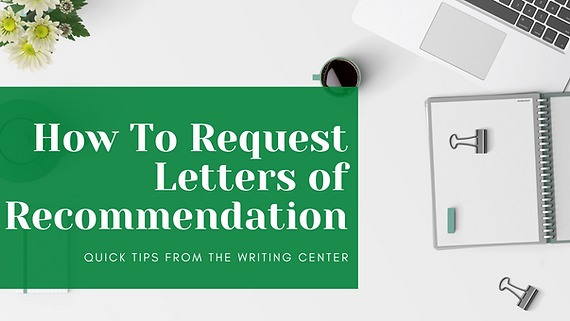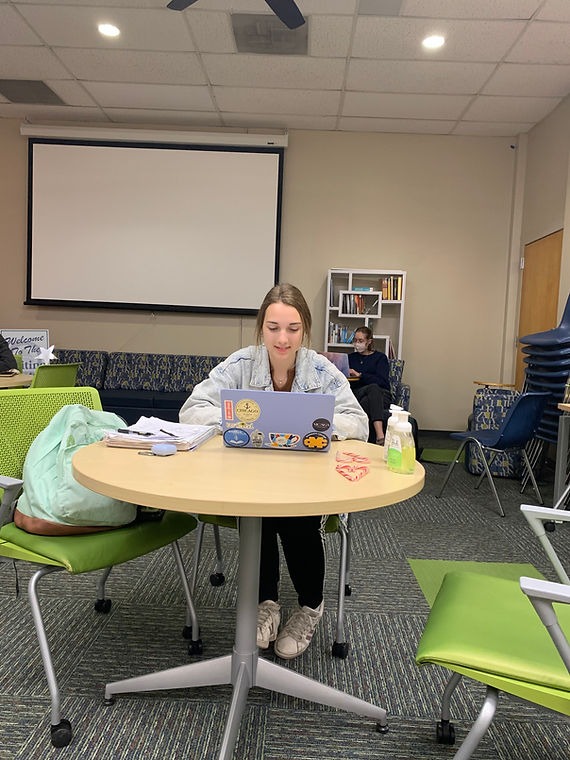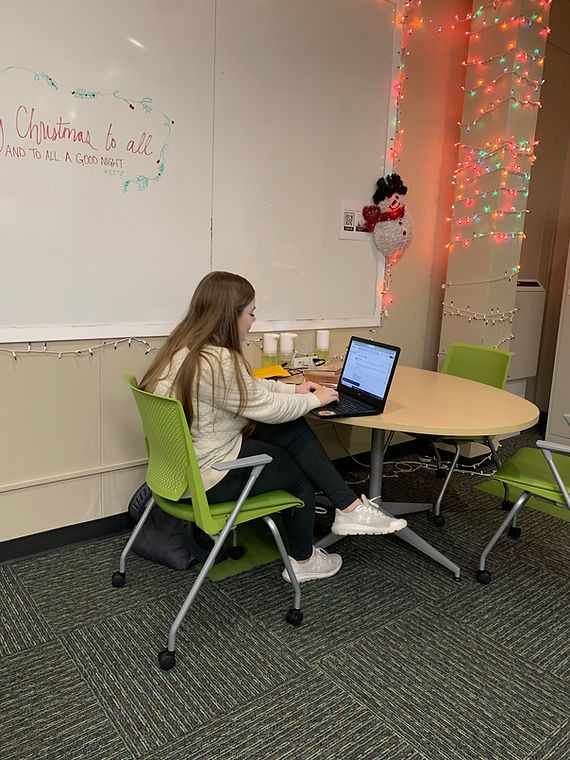How To Request Letters Of Recommendation
by Annie Marks

Hey everyone, it’s Annie again! I can’t believe we’re almost done with this semester! As we quickly approach the new year, many of us are working on applications for graduate schools, programs, internships, and jobs. To help with these applications, I published blog posts earlier in the semester on how to write resumes and personal statements. These aspects of the application are both important, but most applications are not complete without letters of recommendation. While letters of recommendation do not require the applicant to engage in substantial writing or revising, the process of requesting letters of recommendation can be difficult and time consuming. I crafted a few tips on this process to help make this process easier for you!
1. Choose Your Letter Writers
The first step to obtaining letters of recommendation is to create a list of the professors and/or employers you would like to write these letters. To create this list, you can begin by considering which individuals have had a significant impact in your education and career. Think of which professors and employers helped you discover the career you want to pursue, provided you with feedback and strategies that shaped your abilities, or worked with you substantially inside or outside of the classroom. You can write down every professor and employer you believe has impacted you.
Once you have created your initial list, you can narrow this list down by considering how well you know your professors and employers. The individuals who write your letter of recommendation should know you well and have a solid understanding of who you are. These individuals should be able to attest to your abilities, qualities, and strengths using anecdotes and examples from their interactions with you. In addition to your relationships with the professors and employers, you can consider your different experiences with these individuals. The individuals who write your letters should be able to discuss different aspects of your qualities, education, and experience. Although two professors may be able to discuss your leadership qualities, your application will be stronger when a professor talks about your leadership qualities and an employer speaks to your strong determination to succeed.
After considering these factors, you can narrow your list down to the professors and employers you will ask. The number of individuals on this list should depend on how many letters you need. Generally, you should try to ask one or two more people than needed just in case someone cannot write the letter or does not complete it in time.

Create a list of your potential recommenders!
2. Write An Initial Email
Following the creation of your list, you can write the initial email to each professor and employer requesting that they write a letter of recommendation for you. Professors and employers receive many requests for letters of recommendation throughout the year. So, you can help them make a quick decision on whether or not they would like to write your letter by providing them with enough information in the initial email. This information could include:
Refresher of Who You Are: Professors and employers work with many people every year and, as such, may not immediately remember every person they interacted with. If you don’t know your professor or employer very well, you may need to quickly remind them of who you are. You can mention the class you took with them, the job you worked under their supervision, or any specific interactions you had with them, such as a one-on-one meeting or a special project you worked on together.
Why You Are Emailing Them: Once you have introduced yourself, you can tell your professor or employer the reason you are sending them an email. You can inform them that you are in the process of applying to graduate school, a special program, a job, an internship, etc. and provide substantial details about the position you are applying to. You can then state that you would like them to write a letter of recommendation on your behalf for your application.
Your Reasoning For Applying: In addition to explaining what you are applying to, you can tell your professor or employer why you are applying. You can explain why you are pursuing a specific career or educational path, how you became interested in this career, what your short-term or long-term goals are, why you would like to attend a specific school or program, and any other relevant information.
Why The Individual Was Chosen: You can also tell the professor or employer why you chose them to write your letter of recommendation. By providing them with a “why,” they will feel encouraged that they had a substantial enough impact on your life to be selected. They will also understand what qualities of yourself that you believe they can speak to.
The Application Timeline: To help your professor or employer know whether writing a letter of recommendation is feasible, you should inform them what date you would like the letter to be included by. You may want to provide a due date that is a few days or a week earlier than the application due date to allow some flexibility for delays. Although providing an early due date may be helpful, you should ensure that your professor has at least 3 to 4 weeks to write the letter.
Promise To Provide More Information: Instead of overwhelming your professor or employer with too much information in this initial email, you can mention that you will provide more information on your qualities and the process of submitting the letter if they decide to write your letter.
In addition to including this information, you should thank your professor or employer for considering your request and provide them with the opportunity to deny your request.


Write an initial email with substantial information for your recommender to decide!
3. Provide Additional Information and Clarify Logistics
If your professor or employer accepts your request to write a letter of recommendation, you can provide them any additional information they may need or request. They, for instance, may find it beneficial for you to provide them with a list of your qualities and qualifications. You can create a brag sheet of aspects of yourself you find most relevant to your application or your resume. You can also send your personal statement or statement of purpose to provide your professor or employer with a better understanding of your “why” for applying. You may even want to create a list of the skills or the specific features of your interactions with the individual that you want them to mention. By “coaching” your professor or employer on what to include, you can help them understand how you want their letter to add to your application. Along with this substantial information, you can clarify the logistics of how to submit your letter by mentioning the specific details on the steps they will need to take.

Provide additional information to your recommender!
4. Follow Up
After providing your professor or employer with all the necessary information, you can send some follow-up emails throughout your application process. In particular, you may want to send an email reminding them of the application deadline if you asked them for a letter more than a month in advance. You may also send them some emails after they submit your letter. Since your professor or employer contributed to your application, you should send them a sincere email or letter thanking them for writing your letter of recommendation. You can also update them on your application if you are accepted into the position you applied them for. This update will let them know that their letters were useful and helped you in your career!
If you’re struggling to write an email to your professor or employer requesting a letter of recommendation, you can always stop by the Writing Center. We can help draft your email, discuss what information you should include in each email, and aid in creating a professional tone in the emails.



